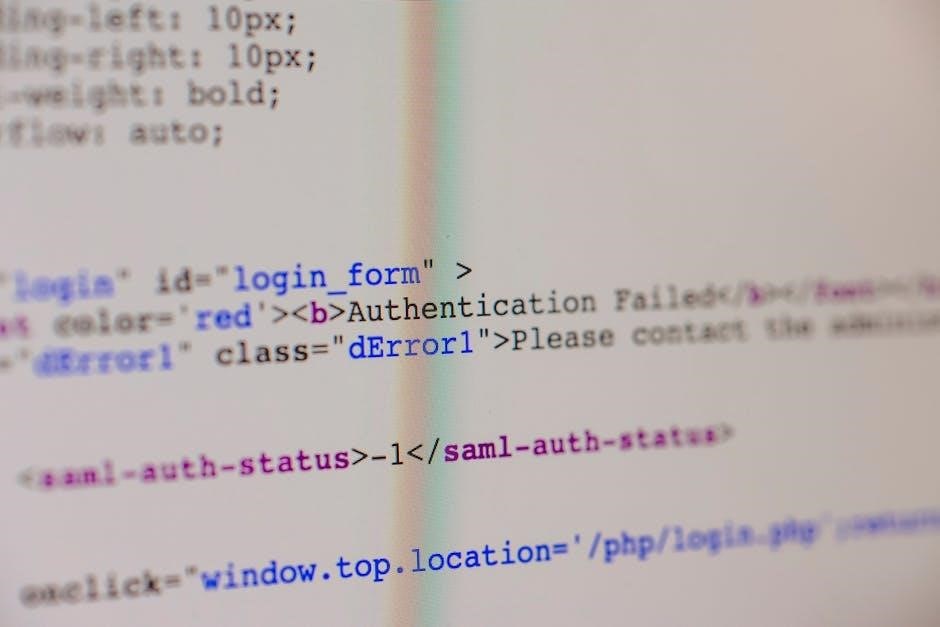form cbt 100 instructions
Form CBT-100 is New Jersey’s Corporation Business Tax return, mandatory for eligible corporations to report income, deductions, and taxes. It ensures compliance with state tax regulations and is filed electronically.
Overview of the Corporation Business Tax (CBT) in New Jersey
The Corporation Business Tax (CBT) in New Jersey is a tax on corporate net income, applicable to both domestic and foreign corporations operating within the state. It is a key source of revenue for New Jersey, ensuring businesses contribute to state funding. Corporations with a nexus in New Jersey, including those conducting business or generating income within the state, are subject to CBT. The tax rate applies to taxable income, with specific deductions and exemptions available. Filing Form CBT-100 is mandatory for eligible corporations, and electronic submission is required for accuracy and efficiency.
Purpose and Importance of Form CBT-100
Form CBT-100 serves as the official document for reporting corporate income, deductions, and taxes under New Jersey’s Corporation Business Tax. Its primary purpose is to ensure compliance with state tax laws, providing transparency in corporate financial activities. The form is essential for calculating tax liabilities and ensuring accurate revenue collection for public services. By filing Form CBT-100, corporations demonstrate adherence to regulatory requirements, maintaining legal and financial integrity. It is a critical tool for both businesses and the state, facilitating the orderly assessment and payment of taxes.

Eligibility Criteria for Filing Form CBT-100
Form CBT-100 is required for corporations conducting business in New Jersey. Eligibility is based on the type of corporation and establishing a nexus with the state.
Types of Corporations Required to File
Corporations required to file Form CBT-100 include those conducting business in New Jersey, having a nexus with the state, or being incorporated there. This applies to C corporations, S corporations, and foreign corporations with New Jersey-sourced income. S corporations electing to be treated as New Jersey C corporations must also file. Additionally, corporations with a physical presence or economic nexus in the state are obligated to submit the form. Filing is mandatory for entities meeting these criteria, ensuring compliance with state tax laws.
Residency and Nexus Requirements for New Jersey
Corporations must file Form CBT-100 if they have a residency or nexus in New Jersey. Residency refers to corporations incorporated or headquartered in the state. Nexus is established through physical presence, such as offices or employees, or economic activities like sales or services in New Jersey. Even out-of-state corporations with nexus must file. Nexus can also be triggered by owning property, conducting business operations, or maintaining economic connections within the state. Understanding these requirements is crucial for determining filing obligations under New Jersey tax laws.

Core Components of Form CBT-100
Form CBT-100 includes income, deductions, and tax liability sections. It requires detailed financial data and supplementary schedules. Compliance with New Jersey tax regulations is essential.
Structure and Layout of the Form
Form CBT-100 is divided into clear sections for ease of navigation. The header includes taxpayer identification and filing status. The main body comprises income, deductions, and tax liability calculations. Supplementary schedules and attachments are required for detailed reporting. The form concludes with a signature section for authorization. Each part is designed to ensure accurate and complete disclosure of financial data. Proper organization is essential for compliance with New Jersey tax regulations.
Key Sections and Lines to Complete
Form CBT-100 includes essential sections that require precise completion. The income section (Lines 1-5) details gross income, adjustments, and net income. Deductions (Lines 6-15) cover allowable business expenses. Taxes (Lines 16-20) involve calculations for tax liability, credits, and payments. Schedule A is critical for itemized deductions. Ensure accuracy in reporting federal taxable income and New Jersey-specific adjustments. Review all lines carefully, as errors can delay processing. Proper completion of these sections ensures compliance with state tax requirements.
Required Documentation and Attachments
To complete Form CBT-100 accurately, ensure all required documentation is attached. This includes the federal income tax return (e.g., Form 1120 or 1120-S), supporting financial statements, and schedules detailing income, deductions, and credits. Additional documentation may include proof of nexus, apportionment calculations, and any federal extensions. Attachments like Schedule A (Income and Deductions) and other applicable supplements must be included. Failure to provide necessary documentation may result in processing delays or penalties. Ensure all submissions are legible and properly signed.

Instructions for Completing Form CBT-100
Complete Form CBT-100 by gathering necessary documents, following step-by-step instructions, and accurately calculating income, deductions, and taxes. Ensure all sections are filled correctly and submit on time.
Step-by-Step Guide to Filling Out the Form
Calculation of Income, Deductions, and Taxes
Reporting Specific Transactions and Adjustments
Report specific transactions, such as non-operating income, gains from asset sales, and rental income. Adjust federal taxable income by adding or subtracting items not recognized under New Jersey law. Include adjustments for depreciation differences, interest income, and other state-specific modifications. Disclose intercompany transactions and apportion income if operating in multiple states. Ensure accurate reporting of deductions and credits, such as net operating losses or research credits. Attach supporting schedules if required. Verify compliance with New Jersey’s unique tax rules to avoid errors.

Special Instructions for S Corporations
S corporations must complete Schedule A, report shareholder distributive income, and ensure proper allocation of income, deductions, and credits among shareholders.
Differences in Filing Requirements for S Corps
S corporations filing Form CBT-100 must report distributive income to shareholders and ensure proper allocation of income, deductions, and credits. Unlike C corps, S corps are pass-through entities, meaning income is taxed at the shareholder level. They must complete Schedule A, which details income and deductions allocated to shareholders. Additionally, S corps must file Form NJ-1040, reporting shareholders’ pro rata shares of income. Specific apportionment rules and nexus considerations also apply, differing from C corporation requirements. Unique deductions and credits may be claimed, but strict compliance with New Jersey’s S corp regulations is essential.
Completing Schedule A of the CBT-100
Schedule A of Form CBT-100 is used to report a corporation’s income, deductions, and adjustments. It mirrors the federal Form 1120, with specific New Jersey modifications. Corporations must detail gross income, cost of goods sold, and operating expenses. Lines 1 through 29 require precise entries, ensuring accuracy in calculating taxable income; Attachments like federal schedules and supporting documentation are mandatory. Proper completion of Schedule A is critical for accurate tax liability determination and compliance with New Jersey’s corporate tax regulations. Ensure all entries align with federal and state reporting requirements.

Electronic Filing Requirements
Electronic filing is mandatory for most CBT-100 returns, ensuring accuracy, faster processing, and better record-keeping. Large taxpayers must use this method.
Mandatory Electronic Submission Rules
The New Jersey Division of Taxation requires electronic filing for Form CBT-100 if your business meets specific thresholds, such as gross income exceeding $1 million. This rule ensures compliance with modern tax reporting standards and reduces errors. Taxpayers must use approved e-file providers or software to submit their returns securely. Extensions of time to file do not exempt businesses from the electronic filing requirement. Failure to comply may result in penalties and delays in processing. Always verify the latest rules before submission to avoid issues.
Payment Methods and Deadlines
Payments for Form CBT-100 can be made electronically through the New Jersey Division of Taxation’s online portal or by mailing a check with a payment voucher. The deadline for filing and payment is typically April 15th for calendar-year corporations, but extensions may apply. Late payments incur penalties and interest. Ensure timely submission to avoid additional charges. For accurate deadlines, always refer to the official New Jersey tax website or consult tax professionals. Proper payment ensures compliance with state tax regulations.

Schedules and Supplements
Form CBT-100 requires various schedules and supplements to provide detailed financial information. These include Schedule A for income and deductions, ensuring compliance with tax reporting standards accurately.
Understanding Schedule A: Income and Deductions
Schedule A of Form CBT-100 is used to report a corporation’s income and deductions. It includes lines for gross income, dividends, interest, and rents or royalties. Businesses must list all deductible expenses, such as compensation, rent, and taxes. A key section is the apportionment of income, where corporations allocate income based on business activity in New Jersey. References to federal forms, like Form 1120, are required for accuracy. Completing Schedule A accurately ensures compliance with state tax laws and avoids potential discrepancies. Proper documentation is essential for verification purposes.
Additional Schedules and Supplements
Beyond Schedule A, corporations may need to complete additional schedules and supplements depending on their specific circumstances. These include Schedule B for dividends and special deductions, Schedule C for apportionment of income, and Schedule G for related member additions. Supplements may cover items like net operating losses or alternative minimum tax calculations. Each schedule provides detailed breakdowns of specific financial elements. Proper completion ensures compliance with New Jersey tax laws and accurate reporting of corporate financial activities. Consulting official instructions or tax professionals is advised to determine which schedules and supplements are required for your corporation.
Common Errors to Avoid
Common mistakes include incorrect data entry, miscalculations, and missed deadlines. Ensure all fields are accurately filled, calculations are double-checked, and submissions are timely to avoid penalties.
Typical Mistakes in Reporting Income
Common errors include incorrect or incomplete reporting of income, such as omitting certain revenue streams or misclassifying income types. Ensure all sources, including gains from sales and passthrough income, are accurately reported. Failure to report intercompany transactions or improperly allocating income can lead to discrepancies. Always verify calculations and ensure compliance with New Jersey tax laws to avoid penalties and delays in processing.
Errors in Calculating Taxes and Deductions
Common mistakes include incorrect application of tax credits and deductions, such as claiming ineligible expenses or miscalculating net operating losses. Ensure accurate computation of taxable income by adhering to New Jersey-specific rules, which may differ from federal guidelines. Overlooking state-specific adjustments or failing to properly allocate income can lead to errors. Always verify calculations and ensure compliance with current tax laws to prevent overpayments or underpayments. Consulting official resources or professional advisors can help minimize these issues and ensure accuracy.

Amendments and Corrections
File Form CBT-100 with the correct information to amend errors. Attach Form NJ-630 for explanations. Submit within three years of the original filing or 180 days after federal amendments.
How to File an Amended Return
To file an amended return using Form CBT-100, start by obtaining the correct form from the New Jersey tax website. Ensure you have Form NJ-630 for explanations of changes. Fill out the form accurately, highlighting corrections and ensuring all errors from the original return are addressed. Sign the form to avoid processing delays. Submit within three years of the original filing date or 180 days after federal amendments. Choose between electronic filing, which is faster and reduces errors, or mailing a paper copy. Include all required documentation, such as a copy of your original return and supporting documents. Double-check the submission address if mailing. Keep a copy of the amended return and follow up if necessary to ensure proper processing. By carefully following these steps, you can successfully amend your return.
Correcting Errors After Submission
If errors are discovered after submitting Form CBT-100, immediate action is required to avoid penalties. For electronic filers, corrections can often be made online through the New Jersey tax portal. Paper filers may need to submit an amended return with a detailed explanation of changes. Ensure all corrected figures align with updated financial records. Highlight the specific errors and provide clear explanations to prevent further delays. Promptly addressing these issues ensures compliance and avoids potential audits or fines. Always verify corrections with the Division of Taxation if unsure.

Additional Resources and Support
The New Jersey Division of Taxation offers comprehensive resources, including guides, webinars, and a dedicated hotline for CBT-100 inquiries. Utilize official websites and professional advisors for tailored assistance.
Accessing Form CBT-100 and Instructions Online
The New Jersey Division of Taxation provides easy access to Form CBT-100 and its instructions through their official website. Visit the NJ Division of Taxation portal and navigate to the Business Tax Forms section. From there, you can download the form in PDF format or access electronic filing options. Additionally, detailed instructions are available online, offering step-by-step guidance for completing the form accurately. The website also includes supplementary resources such as FAQs and tax bulletins to assist filers.
Consulting Professional Tax Advisors
Consulting professional tax advisors can significantly simplify the process of completing Form CBT-100. Tax experts possess in-depth knowledge of New Jersey corporate tax laws and can guide businesses through complex calculations and compliance requirements. They can help ensure accuracy, identify potential deductions, and mitigate risks of errors. Additionally, tax advisors can assist with audits, disputes, or specific scenarios, such as multi-state operations or special tax credits. Their expertise ensures that businesses meet all obligations efficiently and effectively, avoiding costly penalties and optimizing tax outcomes.

Annual Updates and Changes
The New Jersey Division of Taxation periodically updates Form CBT-100 to reflect legislative changes, new regulations, or procedural adjustments, ensuring compliance with current tax laws.
Recent Revisions to Form CBT-100
Recent revisions to Form CBT-100 include updated income reporting lines, new sections for tax credits, and streamlined schedules to reduce filing complexity. Changes aim to align with federal tax reforms and state-specific adjustments. Corporations must ensure they use the latest version of the form to comply with current requirements. The New Jersey Division of Taxation typically releases updates annually, so filers should check for revisions before submitting. These changes often reflect legislative amendments or administrative updates to improve accuracy and efficiency in tax reporting.
Impact of Legislative Changes
Legislative changes can significantly affect Form CBT-100 filings, often altering tax rates, deductions, or credits. Recent updates may include modifications to apportionment rules or the introduction of new tax incentives. Corporations must adapt to these changes to ensure compliance and avoid penalties. Staying informed about legislative updates is crucial, as they can directly impact tax liabilities. Filing accuracy and compliance depend on understanding and implementing these changes correctly. Consulting official resources or tax professionals is recommended to navigate these updates effectively.
Filing Form CBT-100 accurately and timely ensures compliance with New Jersey tax laws, avoiding penalties and ensuring proper tax obligations are met.
Final Tips for Smooth Filing
Ensure all data is accurate and complete before submission to avoid delays or penalties. Double-check calculations for income, deductions, and taxes.
Organize all required documentation and attachments beforehand to streamline the process.
Review the form for any missing signatures or dates, as incomplete forms may be rejected.
Consider e-filing for faster processing and to receive confirmation of submission.
Verify the filing deadline and submit promptly to avoid late penalties.
Consult professional tax advisors if uncertain about any part of the form.
Keep a copy of the completed form and supporting documents for your records.
This ensures compliance and reduces the risk of errors or disputes.
Importance of Timely and Accurate Submission
Filing Form CBT-100 on time and accurately ensures compliance with New Jersey tax laws, avoiding penalties and interest.
Timely submission helps maintain a positive standing with the state and prevents potential audits or disputes.
Accurate reporting ensures proper tax calculations, minimizing errors and reducing the risk of reassessments.
It also facilitates smoother processing of refunds, if applicable, and ensures eligibility for tax credits.
Additionally, accurate and timely filing demonstrates accountability and professionalism.
This practice helps maintain trust with stakeholders and supports overall business operations.
Prioritizing accuracy and deadlines is essential for a seamless and compliant tax filing experience.


